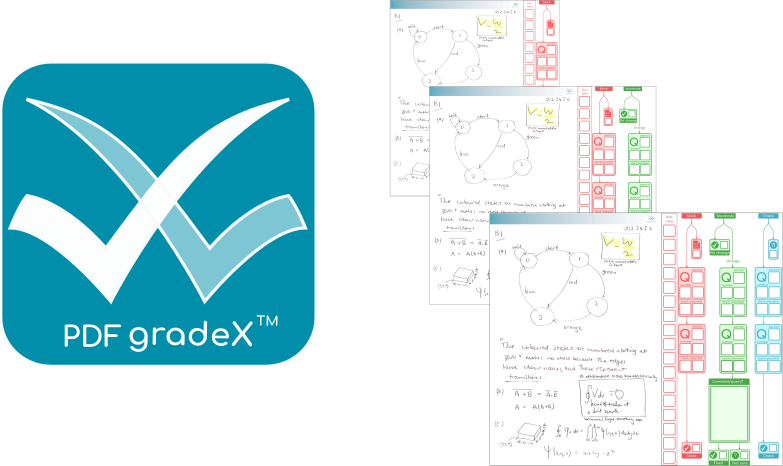
When it comes to marking your remote exams, we know you’re weighing up saving your time, or saving your values (we’re you, too). This open-source project addresses the mass shift overnight of traditional exams by traditional educators into a digital format, so you can save your time and your values…
When the covid-19 pandemic hit a few weeks ago in March 2020, we “wanted” to move our traditional closed-book pen-and-paper exams online, with staff and students both working remotely. The total input for our May honours exams diet is about 6500 student-hours of work in short timed duration exams, producing on average about 10 pages an hour per student. That equates to 65,000 pages that need to electronically marked, moderated, checked and data-entered by a small army of dedicated academic and support staff in the space of a few weeks, whilst working from home. Challenge accepted.
We figured there would be an obvious way to ease the burden with a sprinkling of our favourite condiment – technology. Then we had a conversation that went like this…
“Hey (online assessment expert) what are you going to do about the mountain of exam scans (your unit) are going to get?
us
“There’s this great thing called (obvious solution).
(online assessment expert)
“That looks bang on! NOT enough to
rm -rf $OUR_VIEWS_ON_PROPRIETARY_EDTECHbut we’re impressed. We’d be in for that.”
us
“Yeah, us too, but currently being told we can’t have it. Because (reasons).”
(online assessment expert)
“Mmmm. But we need something ….
us
So we had a look for open source solutions. There are of course some great open source survey tools like https://sdaps.org/ – several in fact. We’ve used them for surveys, and they’re great, but they won’t address our use case. Then there are a plethora of online examination systems – but we have (reasons) for doing it with handwriting (not least, that there is a backup if the net flakes). Then we thought we were onto something which seemed to fit the bill, but we couldn’t find the source code. The conclusion on an associated paper explained why …
“So I did this nice open-source thing, then my uni bought (commercial solution) instead
Someone with <that> t-shirt
Well. That’s that decision made. To the keyboard, we need some quick-wins on handling exam pdfs that we can stand up, test, and roll out in a couple of weeks.
On the plus side –
- Taking action guarantees pain reduction (and we might have some enjoyable moments too)
- moving to (obvious solution) might have been too big of a change management/communication task right now, anyway;
- proprietary edtech bakes in cultural assumptions that make you bend to suit them, not the other way round, so we don’t fancy it in the long term view because we want full freedom to accommodate emerging local contextual factors associated with new initiatives;
- There will always be other organisations who would relish the chance to build on an open source tool to customise it for their unique needs, but who may not have started their own (yet);
- There’s a bunch of stuff we want to assess in future that is not all joined up yet, so we can see this first cut (pdf.gradex™) getting us going, but a future system that uses plugins to workflows to mark anything – hence the “X” in the name;
- real-pen-and-paper-then-upload is an asynchronous system with an appealing robustness when bandwidth is scarce.
So … that should be you all caught up with why we’re implementing automation tools for handling electronic exam marking, even when (commercial solutions) are available elsewhere. Sure, it’s more work initially, but it solves a problem now and opens the way to future growth that supports us, and others – and the more we think about that, the more we like it.